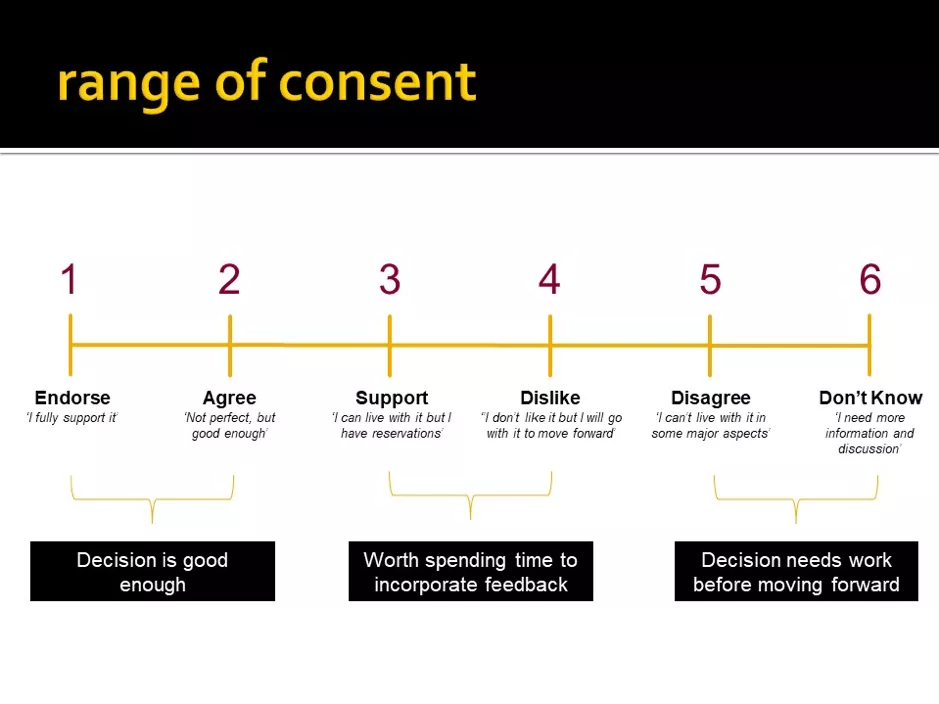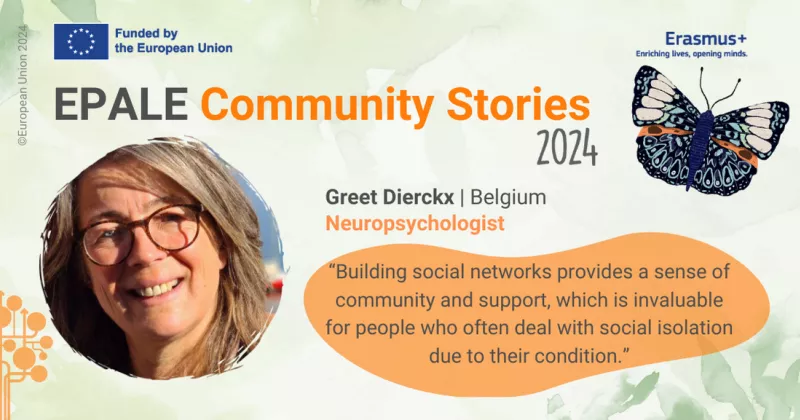Accessing Group Wisdom in Making Decisions

Accessing Group Wisdom in Making Decisions
By Ian Peatey (member of the Erasmus Plus team for Asociația pentru Comunicare Nonviolentă din România)
Introduction
Having participated for the last year in an Erasmus plus funded project entitled ‘Building bridges of dialogue for community cohesion’ I would like to share some insights and thoughts on decision making in communities. I see this as relevant to any group of people sharing prosperity and risks – for example, intentional communities such as eco villages, business organisations, teams, families and even governments.
All communities of people grapple with the question of how best to make decisions. This is as true for families as it is for nations. After all, if a community does not take and implement decisions then it becomes stagnant, irrelevant and soon dies.
I’m especially interested in how a community of individuals can reach decisions that take care of as many needs as possible of those impacted, efficiently and in a way that harnesses the wisdom within the community.
My own experience with the Erasmus team is that consent decision making is a far superior way of doing this than any other in accessing the wisdom in the group and it is this I will focus on mainly.
There is no one-size fits-all-solution
Not all decisions are equally important or urgent. Collecting and processing community wisdom takes time, effort and skill so, ideally, a community uses several different ways to make decisions taking into account advantages and disadvantages of each approach. These are broadly voting, delegating and consenting.
Generally:
Voting is quick and easy but cares only for the needs of the majority. For decisions that impact the whole community voting is polarising and divisive and fails to collect qualitative feedback from the community. It is best used for unimportant decisions that don’t require much time to consider.
Delegating to one person or committee is efficient and effective where those taking the decisions are fully trusted by everyone in the community. Consulting with the whole community will improve the quality of decisions by collecting input from everyone.
Consenting is time consuming and requires individuals to have a certain skill in communication (both speaking up and listening). It is highly effective at collecting and using the wisdom in the community to make decisions that take many needs into account. In this way it improves the quality of and commitment to the decisions made. It is not effective for decisions requiring immediate action such as emergencies.
Each approach has a place in community decision-making, but I will focus in this article on Consenting as the other two are widely known and practiced. Bringing more consenting into the governance of a community where appropriate can significantly enhance cohesion and quality.
Commitment to Dialogue
Working with any group, I always assume that the people in the group have the wisdom to solve any problem or make any decision in front of them. The challenge for most communities then is not lack of wisdom but rather the inability to give enough space for that wisdom to emerge.
I have worked with many dysfunctional groups where a few voices dominate and the rest stay silent. When someone raises an idea that is different or is in contradiction to one of the louder voices, then it is usually either ignored or shot down through argument. Interruptions are common and often there are several people speaking at once. Questions are rare and when they are used they are to seek to destroy ideas. Huge amounts of time get wasted in these ways, as well as the inherent frustration of those who do not get heard.
Dialogue, on the other hand, is a way of communication that is constructive, inclusive and creates safety for people to speak up. There are some core skills that can be learned and enhanced. Here are some that I find especially valuable:
- speaking up concisely and clearly
- speaking from a deeper place than simply expressing opinion
- questioning each other to explore ideas (rather than seeking the speaker to justify)
- allowing people to finish their thought without interruption
- valuing the creativity of silence
- listening with open mind and heart
- building on ideas and looking for what works (rather than looking for problems)
- putting ego to one side and seeking together to find a solution that works for all.
When the community can adopt these practices then the quality of conversation significantly improves – as does the efficiency.
Principle of Consent
At some point, dialogue needs to wrap up and move to a point of decision. I find the principle of consent to be the most helpful in bringing the group wisdom to a close and reaching a decision.
Consent is not the same as agreement and it takes some practice to apply as most of us are raised in binary right/wrong and good/bad thinking. In reality, my individual position regarding a decision is more nuanced than agree/disagree.
In a nutshell, consent means that we can all live with the major aspects of the decision – there are no big objections from anyone. It is about recognising that to find a perfect decision that will get 100% support and endorsement from all individuals may be time consuming and may not even be possible given we are all different. Consent lowers the bar enough so that the community can move forward because it knows we have a ‘good enough’ decision where all major objections have been taken into account.
I like to use a 6 point scale to measure position on a continuum as shown in the picture below:

This scale recognises that there are various points in between 1= Full support and 5= Complete disagreement – all of which provide great potential for discovering important feedback and improvements to the proposed decision.
One this scale consent would be where everyone is at position 1 to 4 and ideally at 1 or 2.
Anyone at 3 or 4 might have valuable information or thoughts that could improve the decision – where it is an important matter it is always worth hearing this and incorporating it.
Anyone at 5 or 6 means there is not consent and the community will be wise to work hard to hear those objections and modify the decision until they are satisfied.
Decision Process
Any process should be in service of the community decision making – meaning it should help bring predictability, focus and forward movement to dialogue and consenting.
Here are some practices I have found especially effective in process design:
- Circle Dialogue: Arrange people in a circle where all can be seen and heard by everyone else and all participants have equal place. Larger communities can be divided into interlinking circles. I would also recommend there are no tables or other barriers so that dialogue flows freely.
- Scaling: Ask everyone in the circle to state where they are on the 6-point scale for the particular decision under consideration. This gives useful information very quickly and it is simple to ask each person to state a number.
- Use the 6 Point scale to get feedback: Focus on those who are at position 5 to see what are the major ‘roadblocks’ and position 6 to see what are the possible blind-spots or missing data. When there is time and the decision is important then also hear from those at 3 or 4 to get valuable insights.
- Reaction rounds: where you hear from everyone in the circle their top-level thoughts about the decision being discussed.
- Start with a clear proposal: you will save time if the decision to be taken is clearly stated. It helps focus the feedback and dialogue. For example, ‘we need to decide what time to start the party’ is too vague and invites debate not dialogue. Try ‘the proposal is we start the party at 19:00’ which allows people to have a position and to state feedback.
- Incorporate feedback in the proposal: the point of dialogue is to construct together, so always collect feedback from circle rounds and incorporate the feedback to improve the proposal.
- Finish the decision round with a formal consent: asking everyone to state ‘I consent’ creates public commitment for the decision.
Finally, each community needs to work out their own process and principles and continue to learn. Decisions will improve over time and the community itself will build cohesion the more it works together in this way.




